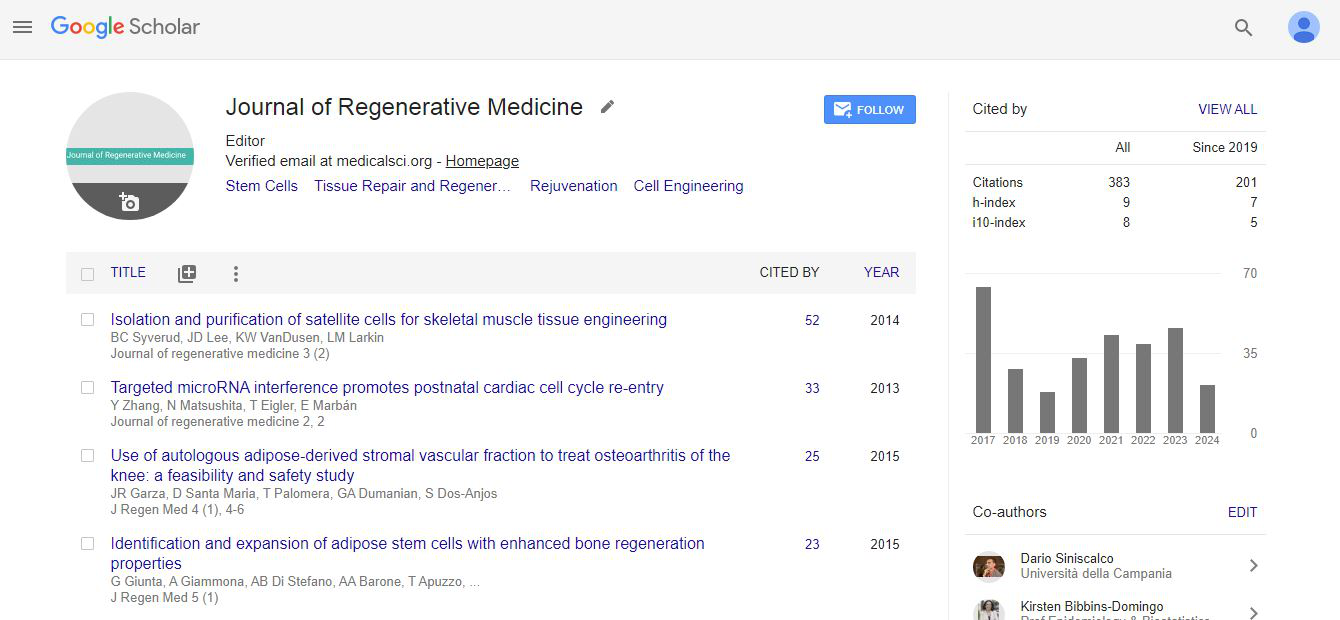Research Article, J Regen Med Vol: 6 Issue: 1
Dedifferentiated Adipocytes Improve Heart Function Post-Myocardial Infarction
Eric J Tsang1†, Maria C Jordan2,3†, Kenneth P Roos2,3, Jessica M Gluck2,4, Medet Jumabay5,6, Kristina I Boström5,6, Richard J Shemin1 and Sepideh Heydarkhan-Hagvall1,7*
1Cardiovascular Tissue Engineering Laboratory, Department of Surgery, Division of Cardiothoracic Surgery, David Geffen School of Medicine at UCLA, 10833 Le Conte Avenue, Los Angeles, CA 90095, U.S.A
2Cardiovascular Research Laboratory, Dept. of Medicine, David Geffen School of Medicine at UCLA, 10833 Le Conte Avenue, Los Angeles, CA 90095, U.S.A
3Department of Physiology, David Geffen School of Medicine at UCLA, 650 Charles Young Drive South, Los Angeles, CA 90095, U.S.A
4Division of Cardiovascular Medicine, Department of Internal Medicine, University of California, Davis; One Shields Avenue, Davis, CA 95616, U.S.A
5Division of Cardiology, David Geffen School of Medicine at UCLA, 10833 Le Conte Avenue, Los Angeles, CA 90095, U.S.A
6The Molecular Biology Institute at UCLA, 611 Charles E. Young Drive East, Los Angeles, CA 90095, U.S.A
7AstraZeneca R&D Gothenburg, IMED CVMD| Translational Science, SE-431 83 Molndal, Sweden
† Both authors contributed equally to this work
*Corresponding author : Dr. Sepideh Heydarkhan-Hagvall
AstraZeneca R&D Gothenburg, IMED CVMD| Translational Science, SE-431 83 Mölndal, Sweden
Tel: +46 (0)31 776 35 11
E-mail: Sepideh.Hagvall@astrazeneca.com
Received: April 06, 2017 Accepted: June 30, 2017 Published: July 06, 2017
Citation: Tsang EJ, Jordan MC, Roos KP, Gluck JM, Jumabay M, et al. (2017) Dedifferentiated Adipocytes Improve Heart Function Post-Myocardial Infarction. J Regen Med 6:1. doi: 10.4172/2325-9620.1000135.
Abstract
Background:The development of pluripotent stem cell-based strategies for regenerative medicine offers hope of one day having a limitless source of therapeutic cells for the repairing of damaged cardiac tissue resulting from myocardial infarction (MI). Dedifferentiated adipose cells (DFAT) have recently gained attention in this regard for their in vitro and in vivo ability to express vascular and cardiac-specific markers. To date, there is limited knowledge with respect to their capacity to improve cardiac function and contractility when introduced into the myocardium after the onset of MI. To that end, this study investigated the in vivo potential of intramyocardially injected mouse DFAT (mDFAT) cells to differentiate towards cardiovascular lineages and enhance cardiac function in a murine model of MI.
Methods: Mature adipocytes were harvested from GFP-transgenic mice and dedifferentiated in vitro to produce pluripotent mDFAT cells. Mice that underwent LAD ligation surgery were injected intramyocardially with a dose of therapeutic mDFAT cells (n=6) shortly after the confirmation of successful MI.
Results: Consistent with previous findings by the authors, we observed an immunofluorescent stain pattern in the infarct area of mDFAT cells adjacent to or co-localized with Troponin T, Cx-43, CD31, isolectin B4 and α-SMA up to eight weeks after cell transplantation. Furthermore, echocardiography and hemodynamic catheterization measurements indicated an overall improvement in global cardiac function, including ejection fraction, fractional shortening and contractility.
Conclusions: This study is the first to report that the transplantation of mDFAT cells into a murine model of MI can preserve cardiac function up to eight weeks after the onset of infarction, suggesting a potential role for DFAT cells as a therapeutic pluripotent cell source in cardiovascular tissue repair.
 Spanish
Spanish  Chinese
Chinese  Russian
Russian  German
German  French
French  Japanese
Japanese  Portuguese
Portuguese  Hindi
Hindi 